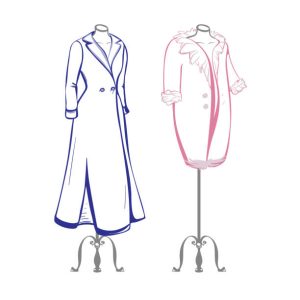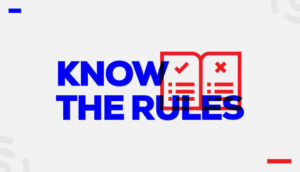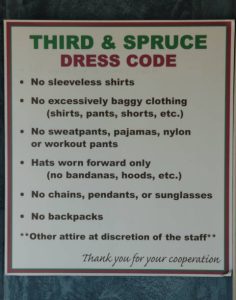
Minister tried to raise dress standards
I remember years ago being asked comment on a situation against the department of immigration by staff in the Sydney Morning Herald “Staff give Amanda a dressing down over dress-up orders”. This as where the Minister tried (and failed) to raise the dress standards in the office. Over the years it struck me how emotionally charged the issue of dress code can be. Its such a personal thing. Can you be dismissed for violating a workplace dress code?
It’s certainly worth an article as more employers work from home. Or having to return to the office after working from home for up to two years. Also as the economy downturns and interest rates rise effecting mortgages and less disposable income is available for discretionary shopping (clothing).,
When violating a workplace dress code can lead to dismissal
There have been countless cases of employees who have been dismissed for refusing to comply with their employer’s dress code. Requiring employees to wear (or not wear) certain clothing or accessories is generally the right of an employer. However, there are limitations as to how far they can go.
A recent viral Reddit post shows just how unreasonable some employers can be when it comes to enforcing a dress code. Let’s look at this astonishing case of employer overreach and insensitivity.

Waitress forced to remove her hearing aids
The employee was 17 at the time of the incident, which took place on her first day as a waitress for a café. She was officially diagnosed with a hearing deficiency, and as such, wears hearing aids. The waitress’ coworkers had been very sympathetic about her disability. They asked her about her hearing aids, and while answering their questions, the waitress mentioned that they have Bluetooth capabilities.
“While talking about everything I mentioned they had Bluetooth capabilities so I could play music through them. Not that I WOULD, but I COULD,” the waitress wrote on Reddit. That’s when her manager, whom the waitress refers to as “Karen,” entered the conversation.
“Karen had been in the room at the time, and said, “You can’t wear those, no earbud policy,” and tapped on the policies paper on the wall,” wrote the waitress.The waitress explained to her manager that the “earbuds” were in fact hearing aids, and that she wasn’t intending to use them to listen to music.
“[Karen’s] reasoning was I didn’t “NEED” them because I wasn’t considered fully deaf, and I was doing this to get around the no earbud policy, directly quoting when I said they could play music,” wrote the waitress.
Had disability aids taken away
It’s often hard to refuse a directive from a manager if you fear that you may be dismissed for doing so. Therefore, the waitress reluctantly complied with her manager’s very insensitive directive. She took her “earbuds” out and started her first shift. Predictably, she experienced extreme difficulty in performing her job.
“I couldn’t understand my trainer, couldn’t hear the customers, couldn’t hear when orders were called to be sent out,” wrote the waitress. “Things were going extremely slow, a couple of warmed pastries burnt since I wasn’t able to hear the timers. Simple sentences had to be repeated multiple times with people basically yelling at me just for me to be able to piece a few words together.”
Finally, after she was accused of “ignoring” one of the café owners, the waitress was confronted by Karen. “Karen came up to me and tried addressing me about it, until she finally realized what was going on after she had repeated herself 5 times,” wrote the waitress. “By the end of that shift, I was allowed to wear my hearing aids, no questions asked.”

Can refusing to comply with a dress code be grounds for dismissal?
The waitress’ experience was no doubt on the extreme end of workplace dress code enforcement. It’s also one that in Australia would flagrantly transgress our anti-discrimination laws. But when it comes to simply being told to wear a collared shirt or a dress of a particular length, are employers within their rights to do so? And if an employee refuses to comply, can they be dismissed?
It’s generally accepted that employers are entitled to set a dress code and expect their employees to comply. However, any directives to employees on how they should dress or present themselves must be lawful, reasonable and not discriminate on any basis.
What if an employee is dismissed for violating a dress code?
If an employee believes they were unfairly dismissed, they may be able to seek reinstatement or compensation through the Fair Work Commission. Let’s look at two unfair dismissal cases that can help you understand how the Commission rules on dismissals relating to dress code non-compliance.
One of these unfair dismissal cases involves an employee who won their case, and the other an employee who lost. Let’s start with Felton v BHP Billiton Pty Ltd [2015] FWC 1838.

Goateed mine worker asked to shave by employer
Since 2008, truck driver James Felton had worked for BHP Billiton at an underground mine in South Australia. In 2010, BHP had implemented a clean-shaven policy at the mine to ensure employees could wear respirators.
Protective gear was required to ensure employees weren’t exposed to harmful fumes. BHP also had strict obligations to protect employees as per state work health and safety regulations. However, it was only in 2014 that the company began strictly applying the clean-shaven policy. This was due to advice proffered to BHP in 2013 about the carcinogens present in the mine.
“It is who I am and my liberty of right:” Mine worker faces dismissal for refusing to shave
Prior to BHP’s crackdown on facial hair, 70 percent of the mine workers had facial hair. Mr Felton, who had for many years sported a moustache and goatee, was the only employee to refuse to comply.
Thanks to the stricter policy, Mr Felton was required to wear a different form of respirator. Previously, he was able to tuck his goatee within his respirator, but the new one was too tight to allow the same. Mr Felton offered to purchase another respirator that he claimed would offer more advanced protection than the one required by BHP. The company however rejected the offer on the basis that the respirator didn’t provide adequate protection.
Given his refusal to shave, Mr Felton received a written warning from BHP that he was in serious breach of his obligations and faced dismissal. To this, Mr Felton emailed BHP stating his refusal to shave. Saying that “My facial hair is my personal attribute, it is who I am and my liberty of right.”
Mr Felton was subsequently dismissed by BHP and thereafter made an unfair dismissal claim with the Fair Work Commission.

The Fair Work Commission rules on the unfair dismissal case
Mr Felton argued to Fair work that his dismissal was harsh, unjust and unreasonable for two reasons. First, that the clean-shaven policy was not valid in light of the circumstances. Secondly, that since he offered to purchase his own respirator, there was no causal connection between the policy and the alleged work health and safety risk.
However, the Fair work Commission ruled that Mr Felton’s dismissal was fair. It found that the clean-shaven policy was reasonable given the risks of working in the mine. Also, because of BHP’s obligation to comply with work health and safety regulations.
Flight attendant who refused to cut hair wins unfair dismissal claim
An example of a successful unfair dismissal claim relating to a refusal to comply with a workplace dress code is Taleski v Virgin Australia International Airlines Pty Ltd [2013] This involved Virgin flight attendant, David Taleski, who refused to cut his hair. Virgin’s dress code contained in its Look Book stated that male employees should keep their tidy, with a natural look no longer than four centimeters in length.
Mr Taleski refused to comply with the dress code hair requirements because he was suffering from Body Dysmorphic Disorder. He claimed that the mental illness made him unable to cut his hair and provided numerous medical certificates to Virgin.
Mr Taleski was removed from flight duties due to his refusal to comply with the dress code. However, he was allowed to return to his duties following a successful conciliation with the Australian Human Rights Commission. In the conciliation, it was agreed that Mr Taleski would wear a wig. It wasn’t established at the time whether this was a permanent or temporary allowance.
Virgin, however, deemed it only a temporary allowance and some time after the agreement, started to pressure Mr Taleski to cut his hair in compliance with its dress code. When he refused, Virgin dismissed Mr Taleski, citing three reasons in his termination letter:
- “You have not complied with reasonable management direction in relation to the provision of documentation as requested;
- You have not demonstrated an intent to comply with the stated requirements of your role; and
- You have displayed an unwillingness to accept business process and decisions surrounding this and other matters.”
Fair Work Commission rules in favor of flight attendant
The Commissioner Anna Lee Cribb found that Mr Taleski’s dismissal was harsh, unjust and unreasonable. She found that his medical certificates provided Virgin with a diagnosis for his mental illness. There was a link between the illness and his inability to cut his hair. The Commission also found that Mr Taleski didn’t have any intention of not complying with Virgin’s dress code, as was claimed by the company.
“Taking all of this into account, I find that, to the best of his ability and within the framework of a body image disorder relating to the length of his hair, Mr Taleski’s intention was to comply with the Look Book,” said Commissioner Cribb. “He made several attempts to do this by exploring options that did not require him cutting his hair. These included trying different hairstyles and wearing a wig.”
Commissioner Cribb ordered Virgin to reinstate Mr Taleski in his former position as a flight attendant.

What if a dress code is discriminatory?
Australia’s state and federal anti-discrimination laws protect employees from being treated unfairly by their employer. This is based on their sex, race, age, disability and religion, among other protected characteristics. The most prominent of these anti-discrimination laws are the General Protections provisions contained in the Fair Work Act 2009.
If an employer has discriminated against an employee or job candidate based on one of their protected characteristics, the employee can make an adverse action claim against their employer. This can allow them to seek remedies in the Fair Work Commission, the Federal Court or the Federal Circuit Court.
What are some examples of discriminatory dress code requests?
For instance, if an employer refuses to hire a candidate of a certain race because they don’t want them to wear their cultural attire at work, the candidate could make an adverse action claim.
The General Protections provisions also protect employees who wear religious clothing or accessories. This could come into play when, for example, an employer’s dress code requires employees not to wear anything on their heads. If the employee is dismissed for wearing a religious head covering, they could make an adverse action claim. It’s highly likely the employer would be found to have discriminated against them.
The General Protections provisions and other state or federal anti-discrimination laws also protect employees from having to comply with gender-specific dress codes. This could include, for instance, female employees being required to wear high heels.
Herbert Smith Freehills employment partner, Tony Wood, told the Sydney Morning Herald that employers risk violating anti-discrimination laws if they issue such directives to their employees.
“… a problem arises if an employer identifies a gender-specific requirement … so, in this situation, directing females to wear high heels would seem to be offensive to most of Australia’s anti-discrimination legislation,” said Mr Wood.

Conclusion to can you dismissed for violating a workplace dress code?
Our team of experts at AWNA can help guide you through the process of making an unfair dismissal or adverse action claim with the Fair Work Commission. We make it easy to understand what your rights are and how you can make the best case. We are the nations leading workplace advisors and commentators. Anything to do with Casual employment rights, workers rights, probation period issues, abandonment of employment, call us anytime.
Call us on 1800 333 666 for a free, confidential discussion about how we can help you successfully claim compensation.
Articles similar to Can you be dismissed for violating a workplace dress code?
Can you be dismissed for refusing to agree to a PIP?






